Flutter vs React: Which one to choose
Choosing between Flutter and React Native in 2025. A practical comparison of performance, UI, ecosystem and cost for real projects.
Flutter vs React Native: Which One Should You Choose?
As in 2025 Many startups and businesses wanted to move fast with the scalable solution that not only cut the development time but also saved money. In this case they have two frameworks that dominate in this space, which are Flutter and React. They both come at the top when it comes to cross-platform app development. Flutter comes up with the robust Dart language developed by Google and open-sourced in 2018, which comes up its UI capabilities and tremendous community support. On the other hand, React uses Javascript, which also has broader community support and faster development.
This blog, Flutter vs React Native will help you and guide you in 2025 which technology is the best to use for platform app development
Now let's deep dive into it.
What is Flutter?
Flutter is an open-source UI kit that is developed by Google, which supports cross-platform application and that can be run with a single codebase within the web, Android, iOS, Linux, Windows, and Mac OS. This was developed by Google in 2017, and before this, Google was already using it in their own products like Google Ads and Google Pay, along with their internal projects. Today, many popular companies such as Alibaba, BMW, eBay Motors, and Tencent are also using Flutter to build their applications.
Advantages of Flutter Development
Fast development
A development cycle is small, which allows developers to see the changes apply in real-time as they make any modification in the code. This feature greatly increases productivity and decreases the time drastically for the development of any application.
Beautiful interface
Flutter provides rich, customised widgets that can be designed beautifully. The user interface is strong, focusing on design and visual appeal.
High Performance
Flutter has become an attractive choice because it provides flexibility, faster time-to-market, and a modern approach to app building, making it a reliable option for businesses and startups.
Performance of Flutter
Flutter is known for its high performance. It is because the code is compiled directly into the native ARM machine code for mobile and desktop. Due to this, it offers smooth animations and faster loading time. This can go up to 60 frames per second. With this, Flutter gives full control for every pixel and screen, which ensures a consistent look across all the platforms.
Cross-Platform Development in Flutter
One of the most powerful and advantageous abilities of Flutter development is its cross-platform support. A Flutter app can run on multiple devices using a single codebase. This includes mobile applications for iOS and Android, web applications, and desktop applications for Windows, Mac, or Linux. It also supports advanced features like smart displays and IoT devices, which makes it a strong and future-ready choice for businesses.
What is React Native?
React Native is an open-source UI software that is developed by the Meta platform. It is used in developing applications for Android, iOS, macOS, tvOS, web, and Windows. This allows developers to use the React framework along with the native platform capabilities, making it easier to build apps across multiple platforms with a single codebase. This React Native app was first published in 2015; since then, it has been widely adopted across the world. It was mainly developed for Android and iOS applications. Some of the most famous apps built on React Native include Facebook, Instagram, and Shopify, along with other popular names like Skype and Walmart.
Advantages of Flutter Development
Performance of React Native
React Native offers good performance because it uses native components along with the JavaScript bridge. It is not fully compiled to native code like Flutter, but it still provides smooth UI and fast loading for most applications. React Native can handle 30 to 60 frames per second depending on the complexity of the app. It allows developers to build high-quality apps with near-native performance.
Cross-Platform Development in React Native
React Native is also a cross-platform framework. With a single codebase, developers can create applications for Android, iOS, Windows, macOS, and web. This reduces development time and cost. It allows integration with native modules for accessing device-specific features, which makes it flexible for building apps across different platforms.
Open Source Community in React Native
React Native has a large and active open-source community. Developers can access a huge number of third-party libraries, plugins, and packages, which helps them add features quickly. The community also provides support for troubleshooting, updates, and improvements. This makes React Native a reliable framework with strong resources available for developers whenever they need help.
Flutter vs React: A head-to-head comparison
If you are choosing a platform framework in 2025, then this section will help you get a clear idea about Flutter and React Native. We look at the real factor that impact your build performance, development speed, and long-term maintenance, taking the this business-first approach.
This will give you clear understanding which tech stack is best fit for the product and timeline
| Category | Flutter (Google) | React Native (Meta) |
|---|---|---|
| Performance | Compiles to native ARM code, enabling smooth animations and fast rendering | Slightly slower for heavy UI, as it primarily relies on JavaScript |
| Development Speed | Fast due to single codebase for iOS and Android | Rapid development using shared code across platforms |
| UI/UX Flexibility | Full control using widgets to build custom, pixel-perfect UIs | Limited customization; depends more on native components |
| Community & Support | Large and growing community ensures strong support | Massive JavaScript ecosystem and developer base |
| Plugins & Libraries | Most common plugins available, though some gaps remain | Extensive third-party library ecosystem |
| Cost & Time to Market | Lower cost and faster delivery thanks to single codebase | Cost-effective for MVPs; scaling may increase costs |
| Maintenance & Scalability | Reliable and scalable, backed by Google | Heavily dependent on timely updates and community maintenance |
How does Voxturr help you with the Flutter App development?
If you are looking for a reliable and strategic development agency to hire a Flutter app developer or React Native developer to work on an MVP or enterprise app, then Voxutrrlab is the one. We have expertise, and our in-house team of dedicated developers are those who have been working for the leading brand across domains, each having an experience of more than 3+ years. For the details, check the our dedicated page.
Conclusion
This Flutter vs React Native comparison will guide you with the reason behind the great popularity. Both are emerging frameworks for cross-platform app development; their capability to run with the single code base makes them unique.

Gaurav Lakhani is the founder and CEO of Voxturrlabs. With a proven track record of conceptualizing and architecting 100+ user-centric and scalable solutions for startups and enterprises, he brings a deep understanding of both technical and user experience aspects. Gaurav's ability to build enterprise-grade technology solutions has garnered the trust of over 30 Fortune 500 companies, including Siemens, 3M, P&G, and Hershey's. Gaurav is an early adopter of new technology, a passionate technology enthusiast, and an investor in AI and IoT startups.

Ready for a Next-Level of Enterprise Growth?
Let's discuss your requirements
You May Also Like
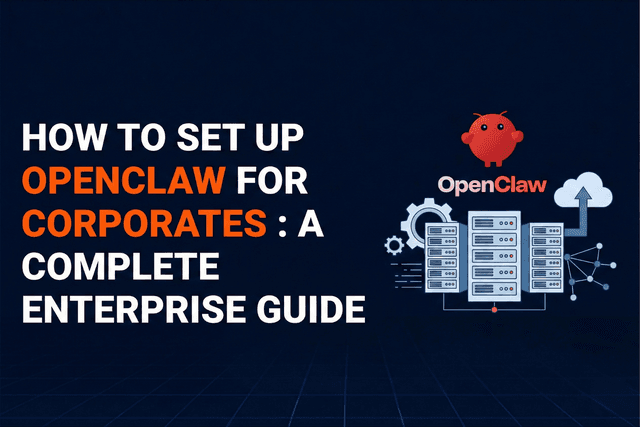
AI Modernization
How to Set Up OpenClaw for Corporates: A Complete Enterprise Guide
A Step by Step Guide to Securely Deploy, Harden, and Scale OpenClaw AI Agents in Enterprise Environments
29 min read
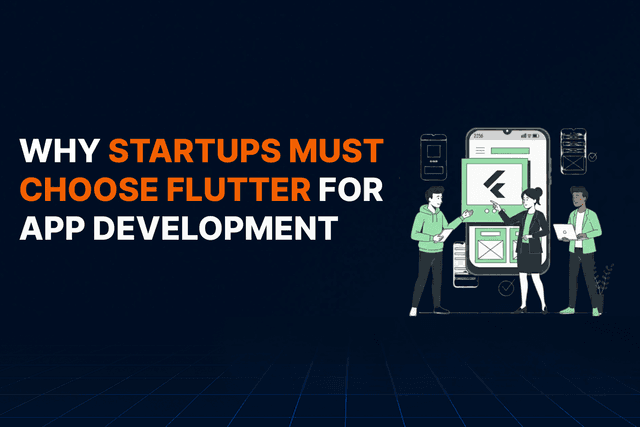
Flutter App Development
Why Startups Must Choose Flutter for App Development
How Flutter Reduces Development Costs, Accelerates Time to Market, and Delivers Near-Native Performance for Modern Startups
8 min read

Flutter Development
Integrating Generative AI and GenUI in Flutter Apps
How AI Generated UI Is Transforming Flutter App Development in 2026
15 min read

Flutter App Development
Best Backend for Flutter: Which Cloud Services Actually Work in 2026?
Firebase vs Supabase vs AWS Amplify: A practical guide to choosing the right backend for your Flutter app without the hype or surprises.
9 min read

Flutter App Development
5 Flutter App Development Mistakes- What to Avoid and Why?
As a developer, you know that building cross-platform apps with Flutter can be incredibly powerful and efficient to bring your ideas to life. With its ease of use, speed of development, and seamless integration with native platforms, Flutter app developme
2 min read
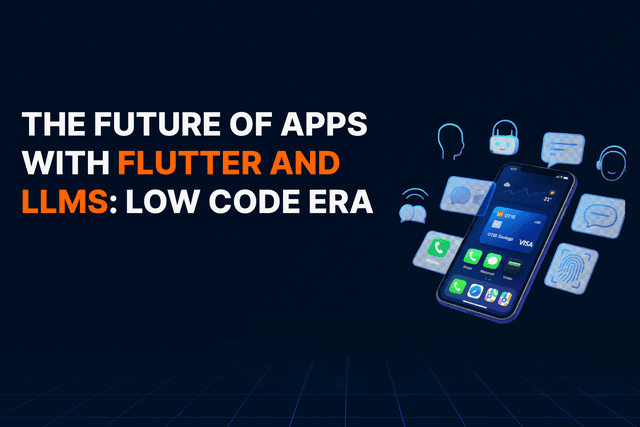
Flutter Development
The Future of Apps with Flutter and LLMs: Low Code
How AI, on-device LLMs, and low-code platforms are reshaping the future of cross-platform app development.
10 min read

Flutter Development
Why Fintech Startups Choose Flutter in 2026
How Flutter Combines Speed, Security, and Scalability for Modern Fintech Products
14 min read
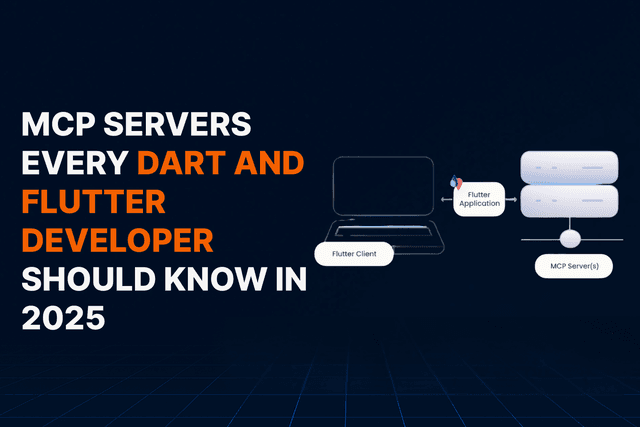
Flutter Development
MCP Servers Every Dart and Flutter Developer Should Know in 2026
How Model Context Protocol servers supercharge AI assisted Flutter development workflows
16 min read
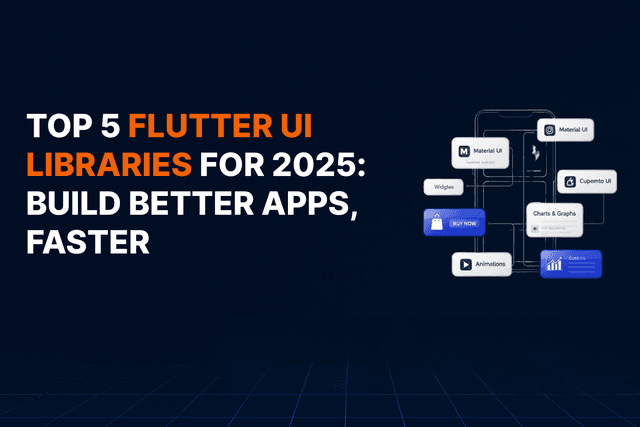
Flutter App Development
Top 5 Flutter UI Libraries for 2026: Build Better Apps, Faster
Your Flutter UI Toolkit Just Got a Major Upgrade
9 min read